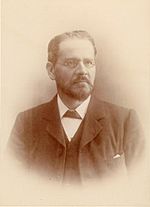Edward Pulsford, Date of Birth, Place of Birth, Date of Death
TweetEdward Pulsford
Australian politicianAbout Edward Pulsford
- Edward Pulsford (29 September 1844 – 29 September 1919) was an English-born Australian politician and free-trade campaigner. Pulsford established a successful business with his father as commission agents in Yorkshire before moving his interests to New South Wales in 1883.
- There he became a vigorous campaigner for free trade, and was a co-founder of the Free Trade and Liberal Association in that colony, the body that would later become the machine behind the Free Trade Party.
- Although his attempts to enter the New South Wales Legislative Assembly were abortive, he was appointed to the Legislative Council in 1895 and served until 1901, when he was elected to the Senate.
- An uncompromising opponent of all forms of protectionism, following the 1909 Fusion of the anti-Labour forces he joined the Liberal Party only with reluctance. Pulsford is also remembered for his avid opposition to the White Australia policy and other forms of racial discrimination.
- Whilst financial editor of the Daily Telegraph he attacked restrictive immigration laws, and he fought against the policy in the state parliament and later in the Senate, where he was one of the few to oppose the 1901 Immigration Restriction Act.
- This racial tolerance, combined with his opposition to women's suffrage, has led the economist John Hawkins to describe him as "probably the least racist but perhaps the most sexist member of the Australian Senate in its first decade".
Read more at Wikipedia
See Also
- Famous People's Birthdays on 29 September, United Kingdom
- Famous People's Birthdays in September, United Kingdom
- Famous People's Birthdays on 29 September, Australia
- Famous People's Birthdays in September, Australia
- Famous politician's Birthdays on 29 September, United Kingdom
- Famous politician's Birthdays in September, United Kingdom
- Famous newspaper editor's Birthdays on 29 September, United Kingdom
- Famous newspaper editor's Birthdays in September, United Kingdom
- Famous politician's Birthdays on 29 September, Australia
- Famous politician's Birthdays in September, Australia
- Famous newspaper editor's Birthdays on 29 September, Australia
- Famous newspaper editor's Birthdays in September, Australia


 Date of Birth:
Date of Birth:  Place of Birth: Burslem, England, United Kingdom
Place of Birth: Burslem, England, United Kingdom